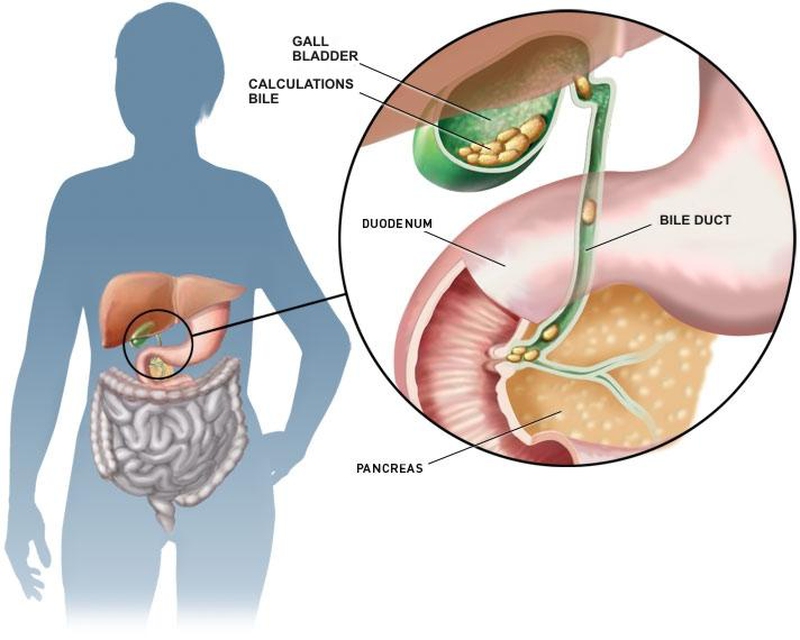Gallstones are small deposits that develop in your gallbladder, a small organ found below the liver. They’re not real stones, but pieces of solid material. Gallstones cause excruciating pain and should be treated as soon as possible. While they’re usually very small in size, there are cases where they can be as large as a golf ball. There are two types of gallstones – cholesterol and pigment gallstones. Cholesterol gallstones are the most common and have a yellow color. They’re composed of undissolved cholesterol and other components. Pigment gallstones are formed when your bile contains excess bilirubin. The pigment gallstones tend to be smaller and darker. So, what causes gallstones? Find out below.

Common Causes Of Gallstones
Too Much Cholesterol
Under normal circumstances, your bile contains adequate amounts of chemicals required to completely dissolve the cholesterol expelled by the liver. If it so happens that the liver is producing more cholesterol than can be dissolved, then there is a chance the cholesterol might form crystals and eventually turn into gallstones.
Too Much Bilirubin
Bilirubin is produced when the body breaks down red blood cells. Sometimes, the liver produces too much bilirubin due to conditions such as biliary tract infections, liver cirrhosis and blood disorders. This excess bilirubin leads to the formation of gallstones.
Gallbladder Malfunction
Sometimes the gallbladder is unable to empty completely or as often as it should. This can cause the bile to become too concentrated and lead to the formation of gallstones.
Risk Factors
What causes gallstones? Here are other factors that increase the risk of gallstone development include:
1. Being overweight or obese can increase your chances of getting gallstones
2. Females are more likely to develop gallstones than men
3. People over the age of 40 are at higher risk than younger people
4. Women who have borne more than one child
5. People who suffer from liver cirrhosis
6. People who have irritable bowel syndrome or Crohn’s disease
7. If you have a family history of gallstones, then there is a high chance you could get them as well
8. Sudden weight loss or undergoing weight loss surgery
9. If you have a condition that’s being treated with the ceftriaxone antibiotic
10. Women who are on the pill
11. If you’re undergoing oestrogen therapy, and are on a high dosage you risk of getting gallstones is higher
12. People suffering from type 2 diabetes
13. Lack of exercise
How to Prevent Gallstones
Eat a Healthy Diet
Avoid skipping meals during the day since doing so can increase your chances of getting gallstones. Skipping meals causes bile to build up in the gallbladder until your next meal. If you go for long without meals the buildup will harden and turn into gallstones. To avoid this sort of situation, eat small meals throughout the day. This enables bile to be removed by the gallbladder constantly.
Control Your Weight
Excessive weight gain can increase the chances of gallstones formation. Avoid high fat foods that can lead to the squeezing and narrowing of the gallbladder. Eat a well balanced diet composed of fresh fruits, vegetables, fiber, low-fat dairy and lean meats.
You should also avoid losing weight too fast. Don’t go on crash diets, but instead focus on losing weight slowly and gradually. You should lose at most 2 pounds per week until you get to your desired weight.
Weight cycling, whereby you frequently lose some weight and the gain some within a short time, can also cause gallstones. It is therefore important to maintain a stable weight.
Actigall (Ursodiol) can be used to dissolve gallstones in cases where you need to lose a lot of weight fast. Xenial (Orlisat) can be used to reduce bile acids during weight loss.
Exercise
Make and stick to a workout schedule. Exercising 5 days a week can go a long way to reducing the chances of getting gallstones. It will also help keep your weight under control. If you could choose one thing in this list, this would be it.
Avoid Certain Mediactions
There are some medications that can increase the possibility of developing gallstones.
Cholesterol lowering medication – Drugs used for lowering cholesterol such as Lopid (gemfribrozil) and Tricor (fenofibrate) can increase the risk of developing gallstones because they increase the amount of cholesterol released in bile.This can easily lead to the formation of gallstones. If for some reason you’re taking these drugs, you should consult with your doctor to find out whether you can switch to alternative cholesterol lowering drugs. Not all cholesterol-lowering drugs have this effect.
Hormone therapy – Women who are undergoing hormone replacement therapy usually have a high risk of developing gallstones. This is down to the fact that estrogen triggers the production of more cholesterol in the body. If you are on hormone therapy and are worried about gallstones, consult with your doctor for alternative hormone medications.
Treatment Options
Now that you know what causes gallstones and how to prevent them, here’s how you can go about treating them .
Surgery – Your doctor can recommend surgery to remove your gallbladder. When this is done, bile will now flow directly from the liver to the small intestine rather than being stored in the gallbladder.
Medications – our doctor can prescribe medications used to dissolve gallstones. It is worth noting that this course of cation can take months or even years to completely get rid of the gallstones. This treatment option is normally recommended for those who can’t undergo surgery.


View All Comments /Add Comment